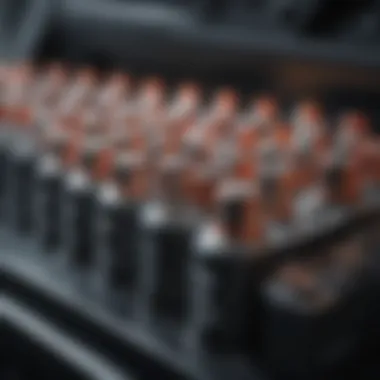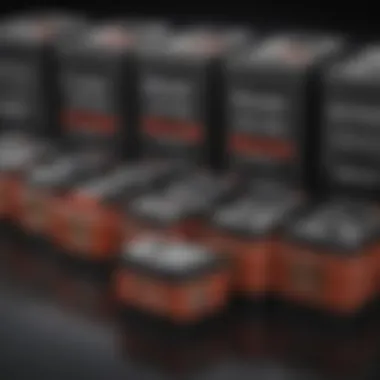Exploring Die Hard RV Batteries: Features and Insights


Intro
When it comes to hitting the road in an RV, power needs to be reliable and sufficient. For many RV enthusiasts, Die Hard batteries have become synonymous with durability and performance. Understanding the ins and outs of these batteries is critical for making informed decisions, especially when one’s adventures depend heavily on consistent power. This article aims to illuminate the various aspects surrounding Die Hard RV batteries, bringing clarity to their features, advantages, maintenance, and compatibility with various camping scenarios.
Product Quality Evaluations
Methodology for Evaluating Quality
To assess the quality of Die Hard RV batteries, one must consider various parameters that dictate their efficacy. This often involves a combination of post-purchase user feedback, third-party reviews, and specifications outlined by the manufacturer. One effective method is to create a comparative rating system that looks at performance under load, battery life, charging times, and overall reliability. Additionally, inspecting the materials and technology used in the battery’s construction—like lead-acid versus lithium-ion—can provide deeper insight into its quality.
Data from technical journals, user forums, and customer reviews can provide invaluable insights:
- Performance metrics: Reviewing real-world tests conducted by users can give a clearer picture of how long these batteries last under continuous use.
- Longevity: Battery lifecycle ratings also play a key role. A battery rated for 300 cycles may not be ideal for extensive travel.
- User Satisfaction: Direct consumer feedback often highlights crucial pain points that might not be apparent in marketing material.
Comparison of Different Models
Within the Die Hard lineup, there are various models tailored to specific needs. Here’s where things get interesting:
- Die Hard Gold: Known for its high capacity and great performance in cold weather.
- Die Hard Platinum: Offers enhanced longevity, making it a robust choice for long-term RVers.
- Die Hard AGM: Features absorbent glass mat technology; it’s excellent for those who prioritize maintenance-free options.
To effectively communicate the differences, it helps to utilize a comparison table that details specifications and ideal use cases for each model:
| Model | Capacity (Ah) | Type | Ideal Use Case | | Die Hard Gold | 100 | Lead-Acid | Occasional camping | | Die Hard Platinum | 120 | Lithium | Long-term use | | Die Hard AGM | 100 | AGM | Maintenance-free trips |
Expert Reviews and Recommendations
Comparisons of Similar Models
When it comes to choosing the right Die Hard battery, looking at other brands can be beneficial. For instance, brands like Optima or Interstate might present comparably priced alternatives, yet their specifications can vary. This comparison can give prospective buyers a well-rounded view:
- Optima Yellow Top: Known for starting power but less ideal for deep cycle usage.
- Interstate 34M: Offers a solid balance between price, power, and durability, but lacking the same performance under heavy load as Die Hard models.
Tips for Buyers
- Assess Your Needs: Determine how much power you require for your trips. Consider what appliances you'll run.
- Research: Explore user reviews on platforms like Reddit or Facebook. Real-world testimony often reveals things that specs can't.
- Warranty: A solid warranty can be an indicator of manufacturer confidence and will help protect your investment.
In summary, selecting a battery that aligns with one’s specific camping needs while factoring in the evaluations from both personal experiences and expert insights offers a pathway to optimal performance in any RV adventure. Acquiring a Die Hard battery could very well be a decision that enhances both travel comfort and reliability, ensuring you power through whatever may come your way.
Preface to Die Hard RV Batteries
In the realm of recreational vehicles, having a dependable power source is paramount. This is where Die Hard RV batteries come into play. These batteries have established a reputation not just for their strength, but for their reliability in various conditions, making them a favored choice among RV enthusiasts. Understanding Die Hard RV batteries offers a peek into the pivotal role they play in enhancing the experience of camping and road-tripping.
Definition and Overview
A Die Hard RV battery is a type of deep cycle battery designed for use in recreational vehicles. Unlike typical car batteries, which provide a rapid burst of energy to start an engine, deep cycle batteries deliver a steady amount of power over an extended period. This makes them ideal for powering various devices in RVs, from lights to refrigerators. When it comes to Die Hard, the brand is synonymous with durability and long-lasting performance, offering several types tailored for different needs and preferences.
In technical terms, Die Hard RV batteries come in multiple configurations, including lead-acid, AGM, and lithium options. Each offers unique characteristics. Lead-acid batteries are generally more affordable but may require more maintenance. AGM (absorbed glass mat) batteries provide better performance in demanding conditions, and lithium-ion batteries, while pricier, have gained traction due to their lightweight and efficient energy delivery.
Historical Context of Die Hard Batteries
The Die Hard brand has a storied history that dates back to the 1960s. Originally, Die Hard focused on automotive batteries before expanding its range to include batteries suitable for RVs. Over the decades, Die Hard has innovated and adapted to meet the changing demands of consumers, often being at the forefront of battery technology.
In the early 2000s, with the rise of RV popularity, Die Hard took significant steps to ensure their batteries met the distinct challenges faced by RV users. This included focusing on deep cycle capabilities and enhancing lifespan through improved manufacturing processes. Today, the Die Hard name isn't just a label; it's become a hallmark of trust. People who choose Die Hard RV batteries often speak highly of their performance, especially in harsh weather conditions and remote locations, where a reliable power source can make all the difference in the world.
"Choosing the right battery for your RV is like finding the right companion for a long road trip; reliability is key."
To sum it up, the legacy of Die Hard batteries is not just steeped in power but also in customer satisfaction. By examining both their definition and historical context, RV enthusiasts can appreciate the importance of these batteries. Recognizing the advantages and innovations that have shaped Die Hard batteries allows users to make informed decisions tailored to their specific adventure needs.
Understanding Battery Technology
Understanding battery technology is crucial when evaluating Die Hard RV batteries, as it illuminates the inner workings and performance capabilities each battery type brings to the table. To make an informed decision, it is essential to grasp the various battery technologies available and how they impact RV performance, reliability, and longevity. This section navigates through common types of RV batteries and their specifications, emphasizing why these elements matter so much.
Types of RV Batteries
Lead-Acid Batteries
Lead-acid batteries have been around for quite some time and serve as a foundational element in RV battery technology. One significant aspect of these batteries is their low cost compared to others. This affordability makes them a popular choice for many RV enthusiasts. They use a combination of lead and lead oxide, submerged in a sulfuric acid solution, to store energy.


A standout characteristic of lead-acid batteries is their ability to deliver high bursts of power, which is particularly beneficial when starting engines or powering appliances that require immediate energy draw. However, there is a downside. They tend to be heavier and bulkier than other options, which might be a concern for some users. Moreover, they require regular maintenance, including checking the water levels, to ensure optimal performance.
While lead-acid batteries can be dependable, their limited cycle life does require consideration. They offer a solid bang for your buck, but longevity might be an issue for long-term RV travelers.
Lithium-Ion Batteries
Lithium-ion batteries mark a significant leap in technology, particularly for RV applications. They offer impressive energy density, meaning they can store more energy in a smaller, lighter package. This feature is becoming increasingly attractive for those looking to optimize their RV weight. Also, they boast a longer cycle life compared to lead-acid counterparts, often lasting up to ten years with proper care.
A key characteristic of lithium-ion batteries is their rapid charging capability. Unlike lead-acid batteries, they can recharge in less time, which can be a game-changer when you're on the go. However, they come with a higher price tag, which could be a dealbreaker for budget-minded buyers. Additionally, they can be sensitive to temperature extremes, affecting their performance.
Overall, lithium-ion batteries are becoming the darling of the RV world, especially for those who prioritize efficiency and space.
AGM Batteries
Absorbent Glass Mat batteries, or AGM batteries, occupy an interesting middle ground in the battery landscape. They utilize advanced technology that absorbs electrolytes in glass mats, allowing them to be spill-proof and maintenance-free. Their robustness makes them suitable for various conditions, effortlessly handling vibrations and temperature fluctuations, a must for any RV enthusiast.
The key characteristic here is their deep cycle capability, allowing them to discharge power over a longer period without damaging the cells. While they tend to be pricier than conventional lead-acid batteries, their longevity and performance under challenging conditions can make them worth the investment.
Nevertheless, they can be slow to recharge, which might be a concern in emergencies where quick power restoration is essential. So, while AGM batteries provide reliability and safety, users should consider potential charging drawbacks.
Key Specifications of Die Hard RV Batteries
Voltage and Capacity
The voltage and capacity specifications play a pivotal role in determining how effectively a battery will perform under various loads. For RVs, the standard voltage is typically 12 volts, but certain configurations, especially those using multiple batteries, can run at higher voltages. Knowing the required capacity, often measured in amp-hours, is essential for matching the battery to your power needs.
The capacity relates directly to how long appliances can run on a single charge. Perhaps the unique feature of this specification is how it influences the total load that can be supported, making it a critical consideration for anyone planning their camping trips with specific power needs in mind.
Cold Cranking Amps
Cold cranking amps (CCA) are vital when considering battery performance in frigid conditions. This specification indicates the battery’s ability to start an engine in low temperatures. For RVers embarking on adventures in colder climates, high CCA ratings can be invaluable, ensuring reliable starts when it counts the most.
This unique feature emphasizes reliability in challenging weather conditions, making it a recommended characteristic for those planning to camp in less than temperate climates. However, one should note that high CCA ratings can sometimes lead to higher costs, so it’s essential to weigh the need versus the investment.
Cycle Life
Lastly, cycle life measures how many charge and discharge cycles a battery can endure before its performance diminishes. This is particularly important for anyone who intends to use their RV battery regularly. A higher cycle life indicates better longevity, reducing the frequency of replacements and saving money over time.
The uniqueness of cycle life stems not just from its direct impact on cost but also on peace of mind. RVers don’t want to worry about replacing their batteries too often, especially during extended trips. Opting for a battery with a superior cycle life can, therefore, pay dividends in the long run.
"Investing in the right battery means understanding its specifications thoroughly. It's not just a purchase; it's an essential part of your RVing experience."
In summary, understanding battery technology helps make informed decisions about which Die Hard RV battery fits your specific needs. Knowing the different types and their characteristics, along with key specifications, sets the foundation for a battery that will support your adventures effectively.
Advantages of Die Hard RV Batteries
When it comes to choosing the right power source for your recreational vehicle, understanding the advantages of Die Hard RV batteries is crucial. These batteries have carved a niche in the competitive market of RV power solutions. Their unique offerings stand out, not just in performance but in reliability and peace of mind for the users. From avid campers to weekend warriors, knowing what sets these batteries apart can significantly influence your purchasing decision.
Durability and Longevity
Durability is a major selling point for Die Hard RV batteries. Unlike many competitors, Die Hard has a reputation for crafting sturdy and resilient batteries. These batteries are designed to endure the rigors of the road and the environment.
Key Benefits of Durability:
- Material Quality: The construction often features high-quality, thick plates that withstand vibrations and shocks that can occur during travel.
- Prolonged Lifespan: Many users report extended lifetimes due to the robust build, providing consistent performance over multiple seasons.
- Resistant to Wear: Be it the harsh sun or frigid winter temperatures, Die Hard batteries demonstrate remarkable resistance to both heat and cold, minimizing risks associated with extreme weather.
In practical terms, this means less hassle for RV owners, as a more durable battery means fewer replacements and repairs, ultimately saving on costs.
Performance in Extreme Conditions
Camping enthusiasts know the unpredictability of nature well. Weather can change on a dime, and so can the demands on your battery. Die Hard RV batteries are engineered to perform well under a spectrum of conditions.
Performance Highlights Include:
- Cold Cranking Amps (CCA): The CCA rating of these batteries is impressive, enabling them to start your RV in cold conditions where other batteries might fail. The design allows for efficient power delivery even when temperatures plummet.
- Hot Weather Resilience: High heat can degrade battery performance, but Die Hard batteries manage to maintain capability in soaring temperatures. This attribute is particularly beneficial for those camping in arid climates or during peak summer seasons.
- Deep Cycling Ability: Many models support deep cycling, permitting users to draw down power without significantly harming the battery’s life expectancy. This is especially valuable for off-grid campers relying on their batteries for vital electrical needs.
"Die Hard batteries give me confidence. Whether I’m in the woods or at a beach campsite, I know my battery can keep up with all my electrical needs."
— RV Enthusiast


In essence, the performance capabilities of Die Hard batteries position them as a reliable choice for any RVer who wants to enjoy the great outdoors without the worry of power loss. As you go deeper into your journey of understanding these batteries, it becomes clear that their advantages are not merely theoretical but grounded in practical application.
Maintenance of Die Hard RV Batteries
The journey with Die Hard RV batteries doesn’t end once you’ve installed your chosen power source in your vehicle. On the contrary, maintenance stands as a cornerstone in ensuring that these batteries operate at optimal performance levels throughout their lifespan. Regular care routines can substantially enhance battery longevity, reliability, and overall functionality. Plus, the consequences of neglect—ranging from diminished efficiency to outright battery failure—can put a serious damper on your camping plans. Hence, understanding the nuances of battery maintenance is not just useful; it’s essential for any RV enthusiast.
Routine Checks and Balancing
Routine checks can be compared to regular health check-ups for a person; a little preventive maintenance goes a long way. So, what should you keep an eye on? One of the first elements to monitor is the state of charge. If a battery often dips below 50%, you might as well be inviting trouble. Using a multimeter or a battery monitor can make determining the state of charge a breeze. Regularly checking water levels in lead-acid batteries is also vital, as they can evaporate and lead to sulfation, which is a fancy way of saying decreased performance.
To maintain a balanced charge, ensure that all batteries in a bank are at similar states of charge when you perform charging cycles. Using a battery equalizer can help minimize discrepancies between batteries, which is especially useful in RV setups where multiple batteries are often connected in parallel.
Moreover, don’t forget about terminal connections. Cleaning terminals of corrosion with a wire brush or a special terminal cleaner can make a noticeable difference in power efficiency. A few moments spent making sure those connections are tight can save you from a bigger headache down the line.
"A stitch in time saves nine." Regular checks often prevent minor issues from turning into major headaches.
Troubleshooting Common Issues
Even the best-maintained Die Hard RV batteries can sometimes misbehave. This is where knowing how to troubleshoot common issues becomes essential.
One of the more frequent problems encountered is the battery not holding a charge. If this occurs, the first place to look is for any parasitic draws—things like lights or other appliances that have been accidentally left on. A simple amperage test can help reveal if something's sapping power when your vehicle should be at rest.
In another scenario, if you find your battery beginning to swell, that’s a telltale sign of overcharging or heat exposure. In this case, it’s crucial to remove the battery immediately to prevent bursting, and evaluate your charging system for any discrepancies.
Lastly, if performance begins to wane during use—like a motor that sputters when you need a reliable electrical boost—consult the warranty or manufacturer's guidelines before making any decisions. Sometimes, what looks like a battery issue can be something else entirely, like an alternator problem.
Maintaining your Die Hard RV battery is not merely about preservation; it’s about enhancing your RV experience overall. A well-maintained battery could lead to smoother, more enjoyable journeys into nature, keeping the stress at bay. As any seasoned RV enthusiast would tell you, the road ahead is better traveled with a reliable source of power.
Comparative Analysis with Competitors
A comparative analysis of Die Hard RV batteries against competitors is essential for any RV owner or enthusiast. It allows potential buyers to discern not only the intrinsic strengths of Die Hard batteries but also to identify the shortcomings when placed alongside other market offerings. Knowledge of competitors helps in making informed decisions, ensuring that the chosen battery aligns with specific needs and preferences.
When considering RV batteries, one must take into account various characteristics such as durability, power output, and price. The terrain and climate in which these batteries operate can significantly influence performance, so understanding how Die Hard stacks up against others in fluctuating conditions is key. In light of this, we will delve deeper into examining competitor brands and their respective offerings.
Competitor Brands Overview
The landscape of RV batteries is teeming with brands vying for consumer attention. A few notable competitors include:
- Energizer: Known for reliability, Energizer has crafted products that often emphasize longevity and robust performance under a range of conditions.
- Optima: Highly regarded for their deep-cycle batteries, Optima brands often cater to off-grid enthusiasts, showcasing their durability in challenging environments.
- VARTA: A player in the battery market that brings European engineering standards to the American RV market, often attracting naysayers with their advanced technologies.
- Interstate Batteries: Offers a wide array of options, where they are often touted for their great customer service and product warranties.
While each of these brands has its unique selling proposition, Die Hard’s reputation for dependability remains a strong draw for many buyers. Understanding the motives behind a consumer's battery choice can provide insights into preferences shaped by performance, price, and perceived reliability.
Performance Metrics Comparison
When evaluating any RV battery including Die Hard and its competitors, some performance metrics take the spotlight, such as:
- Capacity: This indicates how much energy a battery can store. For example, a Die Hard battery may offer a specific amp-hour rating that can be pivotal for overnight camping where power is critical.
- Cold Cranking Amps (CCA): This metric reveals how well a battery performs in low temperatures. A handy feature for those who venture into colder climates.
- Cycle Life: This measures how many charge and discharge cycles a battery can endure before its capacity significantly diminishes. When evaluating Die Hard against others, cycle life can be a game-changer in terms of value.
By diving into the nitty-gritty of these performance metrics, it becomes clear how Die Hard batteries position themselves against competitors. For instance, while some batteries may have higher CCA, Die Hard could shine in longevity or cycling capabilities. Picking the right battery often boils down to understanding these nuances and correlating them to personal usage patterns.
Ultimately, having clear knowledge of competitors and understanding their performance relative to Die Hard can significantly improve decision-making when choosing the right RV battery.
User Reviews and Experiences
When it comes to selecting a power source for recreational vehicles, the choices can overwhelm even the savviest shoppers. This is where user reviews and experiences come in. They serve as the lens through which potential buyers gain insights into products, helping them sift through marketing jargon and understand real-world applications. The opinions and evaluations of those who've relied on Die Hard RV batteries—sometimes in the most testing conditions—are invaluable. You see, it’s the lived experiences that can often reveal both strengths and weaknesses of a product better than any advertisement.
Analyzing Customer Satisfaction
Analyzing customer satisfaction is a critical part of understanding any product, particularly something as vital as a battery for RVs. Feedback on Die Hard RV batteries often covers a broad range of factors, including durability, ease of installation, and customer service support. Here are a few specific elements that stand out:
- Durability Requirements: For RV enthusiasts, durability is non-negotiable. Many reviews highlight how Die Hard batteries hold up over time, making them favorable in long-distance trips.
- Performance Under Stress: Users frequently comment on how well these batteries perform in tough conditions. From extreme heat to bitter cold, the experiences shared often reflect reliability when it matters most.
- Warranty and Support: The backing from manufacturers plays a huge role in customer satisfaction. Reviews frequently mention how responsive the customer service is when any issues arise, facilitating peace of mind knowing help is just a call away.
The insights gathered from user feedback empower prospective buyers to make sound decisions about the right battery for their specific needs. Understanding these experiences can often save both money and frustration down the road.
Common Feedback on Performance
Customers have not shied away from sharing their honest opinions about the performance of Die Hard RV batteries. The general consensus usually provides a mixed bag, but there are some themes that repeatedly pop up:


- Exceptional Power Output: Many users swear by the strong power delivery, claiming that these batteries excel at handling their electrical needs without a hitch. Whether it's powering air conditioning or running appliances, their capacity is often praised.
- Maintenance-Free Design: The allure of maintenance-free batteries cannot be overstated. Numerous customers appreciate that they don’t have to frequently check water levels, marking Die Hard batteries as a convenient choice.
- Longevity: A recurring point is that many find their batteries last longer than expectations. Users often share stories about getting years of reliable usage before encountering performance drops.
"Choosing a good battery is like picking a solid partner for a road trip. You want one that won’t bail on you when the going gets tough!"
In contrast, criticism isn’t absent. A few users mention the high price point compared to other competitors, suggesting that while they’re getting quality, they’re also investing quite a bit upfront. Similarly, some reviews touch on occasional issues with availability, particularly during peak camping seasons. But when weighing these negatives against the positives, many find that the investment pays dividends over time.
In sum, user reviews shed light on performance and experience, informing potential buyers about what they might expect from Die Hard RV batteries. They foster a deeper understanding and confidence that goes hand-in-hand with making a wise purchasing decision.
Selecting the Right Die Hard RV Battery
Choosing the appropriate Die Hard RV battery can feel a bit like navigating a maze. With the nuances of each model potentially impacting the performance and lifespan of your RV, understanding what to look for is crucial. Picking the right battery not only enhances your overall camping experience but also ensures that your electrical systems run smoothly without any hiccups. It’s important to sift through options carefully to find one that aligns with your specific needs.
Factors to Consider Before Purchase
When considering which Die Hard RV battery fits your rig, there are several factors to take into account:
- Capacity and Voltage: Assess the power needs of your RV. A battery with higher capacity delivers energy for longer periods. For instance, if you're planning extended trips, a model with at least 100Ah should be on your radar.
- Weight and Dimensions: Not all RVs have the same space. Ensure the battery fits snugly in the designated compartment; a loose fit can lead to potential damage during travel.
- Type of Battery: Choosing between lead-acid, AGM, or lithium-ion is imperative. Each type brings its pros and cons. For example, lithium-ion batteries are lighter and charge faster but come at a premium price. On the contrary, lead-acid batteries are cheaper but may not hold up as well under heavy usage.
- Climate Considerations: If you frequently camp in extreme temperatures, look for a battery designed to withstand such conditions, as this can impact performance.
Keep these considerations in mind, as they play a pivotal role in ensuring your battery not only meets your needs but also maintains high performance and longevity in various conditions.
Price Range Evaluations
The cost of Die Hard RV batteries can vary widely based on type, capacity, and technology. Typically, you can expect to see prices from around $100 for basic lead-acid models to upwards of $800 for high-performance lithium-ion batteries. It’s beneficial to evaluate:
- Cost-Benefit Analysis: Sometimes, it’s worth investing a bit more for a battery with better performance and a longer lifecycle, especially if you plan to RV regularly.
- Warranties Offered: Some units come with extensive warranties, which can provide peace of mind and indicate confidence in the product's quality. A warranty of three to five years is a good benchmark.
"Choosing a battery is like picking a partner for your journey; make sure it fits your unique lifestyle and needs."
By paying attention to these details when selecting a Die Hard RV battery, you’ll not only gain an understanding of potential costs but also curate the best battery that aligns with your camping aspirations.
Future Innovations in RV Battery Technology
As we look toward the horizon, the future of RV battery technology holds exciting prospects. With the demand for cleaner, more efficient energy solutions rising, manufacturers are exploring innovative approaches to meet the needs of RV enthusiasts. This exploration surrounds more than just upgrades or new models; it represents a fundamental shift in how we power our adventures.
Emerging Technologies
Recent advancements in battery technology are set to change the game for RVers. For starters, solid-state batteries are gaining traction. Unlike traditional lithium-ion batteries, these utilize a solid electrolyte rather than a liquid one. This shift can lead to better safety, increased energy density, and a longer lifespan. Imagine camping in the wild without the nagging fear of battery fires! Further, these solid-state batteries can endure extreme temperatures much better than their predecessors.
Another noteworthy innovation is the integration of solar technology directly into the batteries. Companies are working on systems where batteries can harness solar energy effectively while parked. By using flexible solar panels merged into the RV’s structure, you'd not only get power storage but would also keep a renewable energy source at your disposal. This hybrid approach to energy sourcing echoes the increasing demand for eco-friendly options in travel, pulling at the heartstrings of environmentally-conscious adventurers.
Battery management systems are also becoming more sophisticated, allowing users to monitor performance metrics in real time. Features like wireless connectivity can help you track your RV's battery health from a mobile device. Having access to such data enables users to make informed choices, optimizing their energy consumption while out in the sticks.
"As battery technology continues to evolve, RV enthusiasts will find themselves in a better position to enjoy their travels without compromising on power efficiency and safety."
Impact on RVing Community
The advancements in RV battery technology can significantly impact the RVing community. Firstly, the enhanced reliability and efficiency allow for longer trips off the grid. With longer battery life and faster charging capabilities, RV enthusiasts can enjoy extended stays in remote locations without losing power. This not only encourages exploration but deepens the connection with nature – the true essence of RV life.
Moreover, environmentally-friendly innovations resonate with a growing demographic of RV users. There's an increasing awareness about sustainability among travelers today. By choosing cleaner battery technologies, RVers can significantly reduce their carbon footprint.
On top of that, price considerations also play a crucial role. As technology advances, production costs are likely to decrease. This could lead to more affordable options for the average buyer, making RV travel an accessible and appealing choice for diverse audiences. The community thrives when more people can hit the open road!
Epilogue: The Value of Die Hard RV Batteries
In the ever-evolving world of RV camping and outdoor adventures, having a reliable power source is simply non-negotiable. As we have journeyed through the intricacies of Die Hard RV batteries, it becomes clear that these powerhouses stand out in several crucial areas. Their distinct features cater not just to the immediate needs of energy, but also to long-term performance and user satisfaction, making them a valuable asset for any RV enthusiast.
One must consider how performance and reliability are not mere buzzwords in this context. They are fundamental aspects that influence the overall camping experience. Die Hard RV batteries are designed not only to meet the varying demands of power consumption but also to withstand the rigors of outdoor conditions. Users can depend on their consistent performance, whether it’s powering essentials for a weekend getaway or sustaining longer journeys where access to recharge opportunities may be sparse.
When we look at the advantages that come with Die Hard RV batteries, their resilience in diverse weather situations cannot be overlooked. They maintain potency even when temperatures drop, which is often the Achilles’ heel for many battery types. This durability ensures that RVers can venture into remote locations without the nagging fear of battery failure looming over their plans.
Moreover, the maintenance protocol associated with these batteries simplifies the overall battery management experience. Routine checks and easy troubleshooting contribute to longevity, allowing users to maximize their investment.
"An RV battery should be as ready for the journey as you are."
Final Thoughts on Performance and Reliability
As we conclude, it’s worth noting that the performance metrics of Die Hard RV batteries often exceed expectations. With excellent cold cranking amps and a long cycle life, this battery brand is not just another option; it is a leading contender on the market. Enthusiasts often share stories of how their Die Hard batteries have pushed through extreme conditions, providing peace of mind while on the road. For anyone who takes comfort in knowing their power source can keep up with their adventurous spirit, Die Hard batteries solidly deliver, standing out as a top choice among RV batteries.
Recommendations for RV Enthusiasts
For those considering which battery to invest in, it is worth conducting thorough research. Here are some key points to keep in mind:
- Evaluate Energy Needs: Understand your typical energy consumption. This will guide you in determining the necessary capacity.
- Consider Usage Environment: Factors such as temperature extremes, travel frequency, and load stress should influence your decision.
- Budget Mindset: While Die Hard batteries offer great value, compare prices and look for sales but don't skimp on quality.
- Check Warranty Offers: Look for warranties that reflect the confidence manufacturers have in their products.
In essence, Die Hard RV batteries provide a blend of durability, functional performance, and user-friendly maintenance that appeals to anyone who spends time on the road. As more innovations appear on the horizon, these batteries are poised to remain at the forefront, continuing to enhance the RV experience for seasoned travelers and newbies alike.



